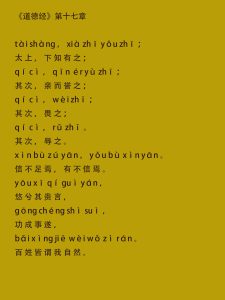Tao Te Ching Chapter 17

Original Chinese Text
太上,下知有之;
其次,亲而誉之;
其次,畏之;
其次,侮之。
信不足焉,有不信焉。
悠兮其贵言。
功成事遂,百姓皆谓我自然。
Pinyin (Pronunciation)
Tàishàng, xià zhī yǒu zhī;
Qí cì, qīn ér yù zhī;
Qí cì, wèi zhī;
Qí cì, wǔ zhī.
Xìn bùzú yān, yǒu bùxìn yān.
Yōu xī qí guì yán.
Gōng chéng shì suì, bǎixìng jiē wèi wǒ zìrán.
白话文翻译 (Plain Chinese Translation)
- 太上,下知有之
- 最好的统治者,人民仅仅知道他的存在。
- The highest ruler is barely known by the people.
- 其次,亲而誉之…其次,侮之
- 次一等的,人民亲近并称赞他;再次一等的,人民畏惧他;最次的,人民轻蔑他。
- The next best is loved and praised; the poorer is feared; the worst is despised.
- 信不足焉,有不信焉
- 统治者诚信不足,人民自然不信任他。
- When trust is lacking, people lose faith.
- 悠兮其贵言
- 悠然自得啊,他很少发号施令。
- How effortlessly he rules, seldom speaking.
- 功成事遂,百姓皆谓我自然
- 功业成就,百姓都说:”我们本来就是这样。”
- When deeds are done, the people say: “We did this ourselves.”
Key Concepts Explained
- 太上 (tàishàng) – The ideal ruler who governs invisibly (呼应 Chapter 66’s “处下”).
- 贵言 (guì yán) – Value of silence in leadership (对比 Confucian emphasis on “正名”).
- 自然 (zìrán) – Spontaneous order emerging without coercion (see Chapter 25’s “道法自然”).
Philosophical Essence
- Leadership Hierarchy
等级 统治特征 人民反应 现代对应 太上 无为而治 仅知其存在 服务型领导 其次 德政仁爱 亲近赞誉 魅力型领导 再次 严刑峻法 畏惧服从 威权统治 最次 昏庸暴虐 轻蔑反抗 失败国家 - Wuwei Governance
- The Sage-King’s absence of interference creates authentic social order (呼应 Chapter 57’s “我无为而民自化”).
- Trust Principle
- “信不足→有不信” anticipates modern social contract theory‘s collapse when trust erodes.
“The mark of a great leader? When the people say: We did this on our own.”
— Modern management interpretation of verse 5’s empowerment philosophy.

One Comment